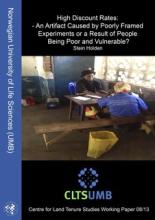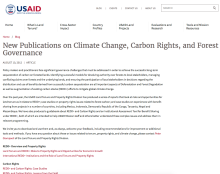Land Library
Welcome to the Land Portal Library. Explore our vast collection of open-access resources (over 74,000) including reports, journal articles, research papers, peer-reviewed publications, legal documents, videos and much more.
/ library resources
Showing items 1 through 9 of 11.Climate risk represents an increasing threat to poor and vulnerable farmers in drought-prone areas of Africa. This study assesses the fertilizer adoption responses of food insecure farmers in Malawi, where Drought Tolerant (DT) maize was recently introduced.
Climate risk represents an increasing threat to poor and vulnerable farmers in drought-proneareas of Africa. This study assesses the maize and fertilizer adoption responses of food insecure farmers in Malawi, where Drought Tolerant (DT) maize was recently introduced.
We use recent panel data on Tanzanian farm households to investigate how previous exposure to weather shocks affects the impact of a current shock.
Guest commentary by Robert Primmer, Land Tenure and Climate Change Specialist, Evaluation, Research, and Communication (ERC) Project.
This study revisits the issue whether poverty and shocks are associated with high discount rates by using an incentive compatible Multiple Price List approach in a poor rural population in Africa where a substantial share of the population had been affected by drought in the recent rainy season.
A guest post by Robert Oberndorf, Resource Law Specialist, Tenure and Global Climate Change Project
This issue brief presents an overview of REDD+ and the associated tenure and property rights challenges and opportunities.
Spanish Translation
Release Date: Wednesday, April 17, 2013File: Land Tenure and REDD+: Risks to Property Rights and Opportunities for Economic Growth
According to AllAfrica.com, farmers in Liberia are blaming perceived climatic changes on the government’s policy of allocating large-scale concessions for mining, logging, and agriculture.
Policy makers and practitioners face significant governance challenges that must be addressed in order to achieve the successful long-term sequestration of carbon on forested lands.






